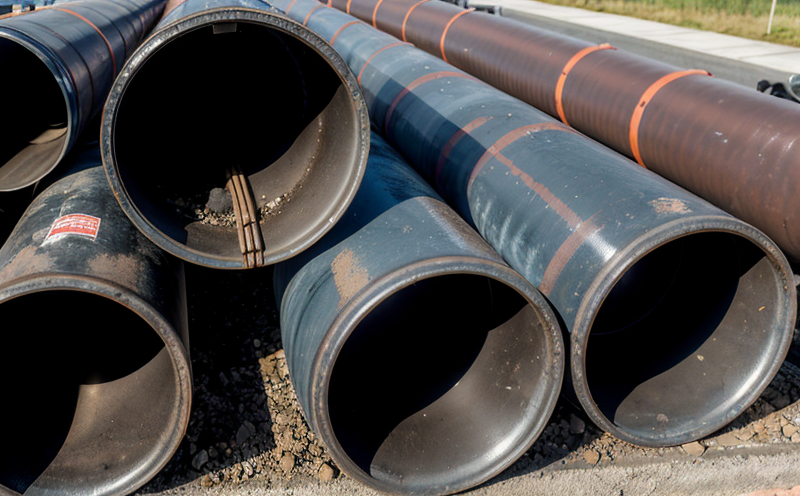API 15LE Testing of Plastic Reinforced Line Pipes
The API 15LE specification is a critical standard for the design and evaluation of plastic reinforced line pipes used in oil and gas industries. This testing ensures that these pipes meet stringent performance requirements under various environmental conditions, ensuring their reliability and safety in harsh offshore environments.
Polymer-reinforced line pipes are essential components in the transportation of hydrocarbons over long distances. These pipes must withstand high pressures and temperatures while resisting external forces such as soil stress, corrosion, and potential impacts from debris during transport or installation. The API 15LE standard provides a robust framework to assess these properties comprehensively.
The testing procedure involves several stages that simulate real-world conditions the pipe might encounter. This includes hydrostatic pressure testing, tensile strength evaluation, impact resistance checks, and flexibility assessments. Each stage is designed to evaluate different aspects of the pipe's performance:
- Hydrostatic Pressure Testing: Ensures the pipe can handle high-pressure fluids without leakage.
- Tensile Strength Evaluation: Assesses the pipe's ability to resist tensile forces during installation and operation.
- Impact Resistance Checks: Tests the pipe's resilience against sudden impacts, which is crucial for protecting equipment in offshore installations.
- Flexibility Assessments: Ensures the pipe can bend without compromising its structural integrity or performance.
The testing process also includes visual inspections and non-destructive testing (NDT) techniques such as ultrasonic testing, radiographic examination, and magnetic particle inspection to detect any internal or external flaws. This ensures that every segment of the pipe meets the specified quality standards before it is used in critical applications.
Understanding these tests helps stakeholders involved in oil and gas operations make informed decisions about selecting appropriate materials for their projects. Compliance with API 15LE not only enhances operational safety but also supports regulatory compliance, which can significantly reduce risks associated with non-compliance penalties or accidents.
In summary, the API 15LE testing protocol is vital for ensuring the integrity and reliability of plastic reinforced line pipes used in oil and gas industries. By adhering to this standard, manufacturers and operators can enhance safety, extend service life, and comply with international regulations.
Benefits
The benefits of API 15LE testing are manifold, particularly for those involved in the design, manufacturing, and operation of plastic reinforced line pipes. Here’s how it impacts various stakeholders:
- Manufacturers: Ensuring compliance with this standard helps manufacturers meet industry demands and international regulatory requirements.
- Operators: Reliable testing results reduce the risk of pipe failure, ensuring safer operations in challenging environments.
- Regulatory Bodies: Consistency in quality across different suppliers supports easier enforcement of safety norms.
- Safety: By rigorously testing pipes, potential hazards are minimized, thereby enhancing overall operational safety.
In addition to these direct benefits, there are indirect advantages too. For instance, successful completion of API 15LE testing can lead to higher trust from clients and partners, opening up new opportunities for business growth. It also aids in maintaining a good reputation within the industry, which is crucial for long-term success.
The robustness of API 15LE standards fosters innovation by encouraging continuous improvement in manufacturing processes and material selection. This commitment to excellence ensures that even minor improvements can translate into significant advancements over time, driving technological progress within the sector.
International Acceptance and Recognition
The API 15LE standard has gained widespread acceptance across different countries due to its comprehensive approach towards ensuring pipe integrity. Many countries recognize this standard as a benchmark for quality in plastic reinforced line pipes, making it an integral part of procurement processes worldwide.
In the United States, Canada, and various European nations, adherence to API 15LE is often required by law or recommended by regulatory bodies like OSHA (Occupational Safety and Health Administration) or ECHA (European Chemicals Agency). This recognition underscores its importance not just within specific industries but also across broader sectors.
Moreover, international oil companies frequently specify that their suppliers must comply with these standards. This requirement ensures consistency in quality among different suppliers globally, promoting fair competition based on merit rather than varying local standards.
The growing trend towards sustainable practices has further increased demand for API 15LE compliant products. As environmental concerns become more pronounced, industries are seeking ways to minimize their carbon footprint while maintaining high levels of performance and safety. Compliance with this standard helps manufacturers align their offerings with these goals, appealing to environmentally conscious consumers.
Overall, the global acceptance of API 15LE reflects its significance in establishing trustworthiness among stakeholders involved in oil and gas operations worldwide.
Competitive Advantage and Market Impact
Compliance with the API 15LE standard provides significant competitive advantages for manufacturers and suppliers operating within the polymer & plastics testing sector. It not only enhances product quality but also differentiates offerings from competitors by demonstrating adherence to stringent international standards.
For manufacturers, meeting these requirements opens doors to larger markets where regulatory compliance is mandatory. This increases sales volume and market share, ultimately leading to increased profitability. Suppliers who comply with API 15LE can expect higher demand as buyers prioritize safety and reliability in their procurement decisions.
The standard also encourages innovation by promoting continuous improvement in manufacturing processes and material selection. Manufacturers that invest in advanced technologies and methodologies to meet these stringent criteria often see improvements in efficiency, reducing costs associated with production and maintenance. These cost savings can then be passed on to consumers through competitive pricing strategies, further enhancing market competitiveness.
Furthermore, compliance with API 15LE contributes positively towards a company’s reputation. A strong reputation built around quality assurance fosters customer loyalty and attracts new business opportunities. Clients are more likely to choose suppliers who have demonstrated their commitment to excellence through rigorous testing protocols like those outlined in API 15LE.
From an environmental perspective, adhering to such standards aligns with global efforts towards sustainability. By reducing waste generation during production cycles and improving resource utilization efficiency, manufacturers contribute positively towards minimizing their ecological footprint. This alignment with sustainable practices can significantly enhance a company’s image among eco-conscious consumers and stakeholders.





